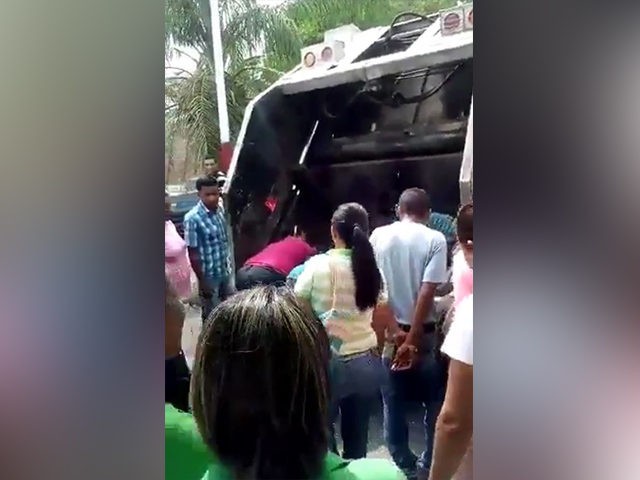Venezuelan conservative leader María Corina Machado shared a video this week showing citizens in the country using a garbage truck to transport an injured person to a clinic in lieu of an ambulance.
The video shows a group of people placing a man clearly incapable of walking arriving in front of a clinic in the back of a garbage truck.
“And some come out to ask that we don’t call it a ‘failed state’ because that damages the dialogue,” Machado remarked, referring to the small minority of Venezuelan political elite still seeking talks with socialist dictator Nicolás Maduro. “While our country collapses in the hands of criminals, we have to ask ourselves, who is worse, them, or the ones who want to cohabitate with them?”
Machado, a former lawmaker whom Maduro’s henchmen violently expelled from the National Assembly in 2014, is the leader of the right-wing Vente Venezuela party, which has repeatedly found itself at odds with the leadership of President Juan Guaidó, the socialist leader of the opposition. While constitutionally the president of the country, Guaidó has failed to exercise any of his powers as Maduro has refused to vacate. Most Venezuelans, polling shows, do not consider him their leader.
The video has gone viral in Venezuelan media following Machado’s post but appears to be from 2019. The Venezuelan news organization NTN24 identified the video at the time as being from Portuguesa state and explained that residents used the garbage truck because they had no access to an ambulance or any other emergency vehicle.
The situation is not an unusual one in Venezuela. The Spanish news wire service EFE detailed a similar story in early February of this year of “paramedics” using a pick-up truck to tend to a man who had barely survived being hit by a tow truck. The “paramedics” are part of a vigilante group known as the “Highway Angels” who organized to help victims of the increasingly common traffic accidents in Caracas, in light of the fact that the government does little to help those in need.
Under late dictator Hugo Chávez, Venezuela established a socialist universal healthcare system. Under the Chávez-drafted national constitution, health care is considered a “human right,” but access declined dramatically as the socialist government failed to properly invest in the health sector. Under Maduro, Venezuela rapidly began to run out of basic medications until, by 2016, hospitals were urging patients to bring their own medicine, as they were not stocked. Upwards of 90 percent of the basic medications the World Health Organization (W.H.O.) considers indispensable to functional health care have not been available in Venezuela for years. The list includes items like birth control, antibiotics, painkillers, and advanced drugs for HIV, cancer, and other potentially terminal diseases.
Compounding the unfortunate medical situation is the fact that, for years, the Venezuelan socialist regime has largely failed to properly sanitize locations it is responsible for, from hospitals to public streets. Large piles of garbage have lined the streets of Caracas for years, featuring decaying food and other toxic substances. Starving Venezuelans have notoriously resorted to eating scraps out of these piles of garbage, exposing them to potential infections for which they have no access to antibiotics to fight.
In response to this humanitarian crisis, Maduro has repeatedly denied that anything is wrong and blocked humanitarian groups like Doctors Without Borders from entering the country.
The medical situation has triggered international alarm in light of the Chinese coronavirus pandemic, which Venezuela entered 2020 extremely ill-prepared to combat. Maduro has responded to the pandemic with a bizarre quarantine strategy he dubbed “7+7”: for seven days, the nation is forced into a strict lockdown, schools and businesses are closed, and police limit mobility. For the next seven days, all restrictions lift, returning life to normal. There is no evidence that the strategy has benefited Venezuela in any way, and it has more recently been used to allow Maduro to lift lockdowns for holidays like Christmas and Carnaval.
Failing to procure one of the many Chinese coronavirus vaccine candidates currently available, Maduro has also taken to publicizing dubious coronavirus “cures” including “rectal ozone therapy” and the use of a substance he has dubbed “miracle droplets.” International public health experts have actively discouraged the administration of ozone to fight Chinese coronavirus, as the amount necessary to kill the virus is greater than the amount necessary to kill a person. The droplets, meanwhile, have undergone no independent verification process. Facebook recently censored Maduro’s promotion of these “cures,” prompting Maduro to call Facebook founder Mark Zuckerberg an “abuser.”
Venezuela claims to have documented only 133,927 cases of Chinese coronavirus and 1,292 deaths attributable to a coronavirus infection nationwide, significantly less than the millions of cases documented in neighboring countries like Brazil and Colombia. International observers have questioned the legitimacy of the Maduro regime’s tallies, particularly in light of the sparse use of PCR testing in the country. A poll by the firm Meganálisis published in October found that 87 percent of Venezuelans told that they had coronavirus did not receive PCR tests, meaning they were not counted towards the official number of cases.

COMMENTS
Please let us know if you're having issues with commenting.